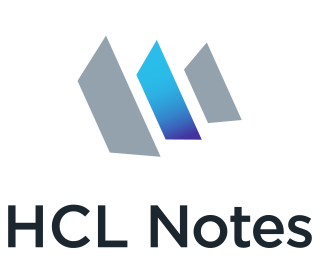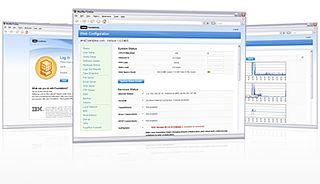Related Research Articles

HCL Notes is a proprietary collaborative software platform for Unix (AIX), IBM i, Windows, Linux, and macOS, sold by HCLTech. The client application is called Notes while the server component is branded HCL Domino.
Lotus Software was an American software company based in Massachusetts; it was sold to India's HCL Technologies in 2018.
HCL Sametime Premium is a client–server application and middleware platform that provides real-time, unified communications and collaboration for enterprises. Those capabilities include presence information, enterprise instant messaging, web conferencing, community collaboration, and telephony capabilities and integration. Currently it is developed and sold by HCL Software, a division of Indian company HCL Technologies, until 2019 by the Lotus Software division of IBM.
WebSphere Application Server (WAS) is a software product that performs the role of a web application server. More specifically, it is a software framework and middleware that hosts Java-based web applications. It is the flagship product within IBM's WebSphere software suite. It was initially created by Donald F. Ferguson, who later became CTO of Software for Dell. The first version was launched in 1998. This project was an offshoot from IBM HTTP Server team starting with the Domino Go web server.
OfficeVision was an IBM proprietary office support application.
Nitix was a retail Linux distribution, produced in Canada. The software is developed by Net Integration Technologies, Inc., which has been acquired by IBM as of January 2008 and currently operates as IBM Lotus Foundations.
IBM Storage Protect is a data protection platform that gives enterprises a single point of control and administration for backup and recovery. It is the flagship product in the IBM Spectrum Protect family.
HCL iNotes offers a full-featured web-based version of HCL Technologies's HCL Notes client. Formerly known as IBM Lotus Domino Web Access, HCL iNotes provides HCL Notes users with browser-based access to their HCL Notes mail, calendar, and contacts. The software combines with HCL Domino software to provide a client interface that is available both online and offline. It provides access to collaboration tools using a variety of Web browsers across multiple platforms.
BlackBerry Enterprise Server designates the middleware software package that is part of the BlackBerry wireless platform supplied by BlackBerry Limited. The software plus service connects to messaging and collaboration software on enterprise networks to redirect emails and synchronize contacts and calendaring information between servers, desktop workstations, as well as mobile devices. Some third-party connectors exist, including Scalix, Zarafa, Zimbra, and the Google Apps BES Connector, although these are not supported by BlackBerry Limited. As of June 2018, BlackBerry Enterprise Server has been renamed to BlackBerry Unified Endpoint Manager (UEM).
Ubique was a software company based in Israel. Founded in 1994, Ubique is notable for launching the first social-networking software, which included features such as instant messaging, voice over IP (VoIP), chat rooms, web-based events, and collaborative browsing. The company is best known for its most prominent product, Virtual Places, a presence-based chat program that allowed users to explore websites together. This software required both server and client components, enabling users to overlay avatars onto their web browsers and collaborate in real-time as they visited websites. Virtual Places was utilized by providers such as VPChat and Digital Space and eventually evolved into Lotus Sametime. Despite advancements and changes, some consumer-oriented communities still use older versions of Virtual Places.
IBM App Connect Enterprise (abbreviated as IBM ACE, formerly known as IBM Integration Bus, WebSphere Message Broker, WebSphere Business Integration Message Broker, WebSphere MQSeries Integrator and started life as MQSeries Systems Integrator. App Connect IBM's integration software offering, allowing business information to flow between disparate applications across multiple hardware and software platforms. Rules can be applied to the data flowing through user-authored integrations to route and transform the information. The product can be used as an Enterprise Service Bus supplying a communication channel between applications and services in a service-oriented architecture. App Connect from V11 supports container native deployments with highly optimised container start-up times.

IBM Lotus Symphony is a discontinued suite of applications for creating, editing, and sharing text, spreadsheet, presentations, and other documents and browsing the World Wide Web. It was first distributed as commercial proprietary software, then as freeware, before IBM contributed the suite to the Apache Software Foundation in 2014 for inclusion in the free and open-source Apache OpenOffice software suite.
IBM Lotus Expeditor is a software framework by IBM's Lotus Software division for the construction, integration, and deployment of "managed client applications", which are client applications that are deployed from, configured, and managed onto a desktop, usually by a remote server. The goal is to allow developers to create applications that take advantage of running on a local client, while having the same ease of maintenance as web-based applications.
IBM Forms is a suite of products by IBM's Lotus Software division that interact to develop and deliver data-driven, XML-based electronic forms (e-forms) to end-users. IBM Forms consists of a server, designer, and client viewer that enable creation, deployment, and streamlining of forms-based processes. IBM Forms originally used Extensible Forms Description Language (XFDL) as the format for its electronic forms, and it has gradually added XForms to XFDL as that standard has matured.

WaveMaker is a Java-based low-code development platform designed for building software applications and platforms. The company, WaveMaker Inc., is based in Mountain View, California. The platform is intended to assist enterprises in speeding up their application development and IT modernization initiatives through low-code capabilities. Additionally, for independent software vendors (ISVs), WaveMaker serves as a customizable low-code component that integrates into their products.

IBM SmartCloud for Social Business is a suite of business networking and collaboration cloud-based services hosted by the IBM Collaboration Solutions division of IBM. The integrated services that are covered by this software are social networking for businesses, online meetings, file sharing, instant messaging, data visualization, and e-mail.
XPages is an IBM implementation of JavaServer Faces with a server side JavaScript runtime and the built-in NoSQL database IBM Domino. It allows data from IBM Notes and Relational Databases to be displayed to browser clients on all platforms.

Lotus Foundations is a bundled small-business server solutions package by IBM. The package includes Lotus Domino, directory services, file management, firewall, backup, web hosting and various other productivity tools.
WebSphere Portal is an enterprise software used to build and manage web portals. It provides access to web content and applications, while delivering personalized experiences for users.
References
- ↑ Wylie Wong, IBM brews Java for Lotus software, CNET News.com, January 28, 2002
- ↑ Martin LaMonica, IBM accelerates Lotus consolidation, CNET News.com, March 3, 2003
- ↑ David Becker, Lotus to expand collaboration tools, CNET News.com, November 4, 2003
- ↑ Stacy Cowley, Lotusphere: Customers eye Workplace with interest, but are wary, IDG News Service, January 28, 2004
- ↑ John Vaughan, Get your shades: Lotus looks bright again Archived 2007-09-10 at the Wayback Machine , SearchDomino.com, February 2, 2005
- ↑ Ed Brill, IBM View: Lotus Notes Is A Part Of The IBM Workplace Family, IBM Lotus (op-ed in Information Week), March 16, 2005
- ↑ IBM, Software withdrawal and service discontinuance: IBM Workplace Messaging, December 12, 2006
- ↑ David DeJean, Good Riddance To IBM Workplace, InformationWeek, January 22, 2007
- ↑ IBM ,IBM Software support lifecycle: Workplace Collaboration Services 2.6.x, ibm.com, October 14, 2010
- ↑ Hillesley, Richard (July 6, 2011). "OpenOffice – splits and pirouettes". The H online. Heinz Heise . Retrieved May 9, 2012.
- ↑ "IBM Announces New Version of Workplace Products With Enhanced Support for Open Standards and Improved SOA Functionality". www-03.ibm.com. January 23, 2006. Archived from the original on February 17, 2006.